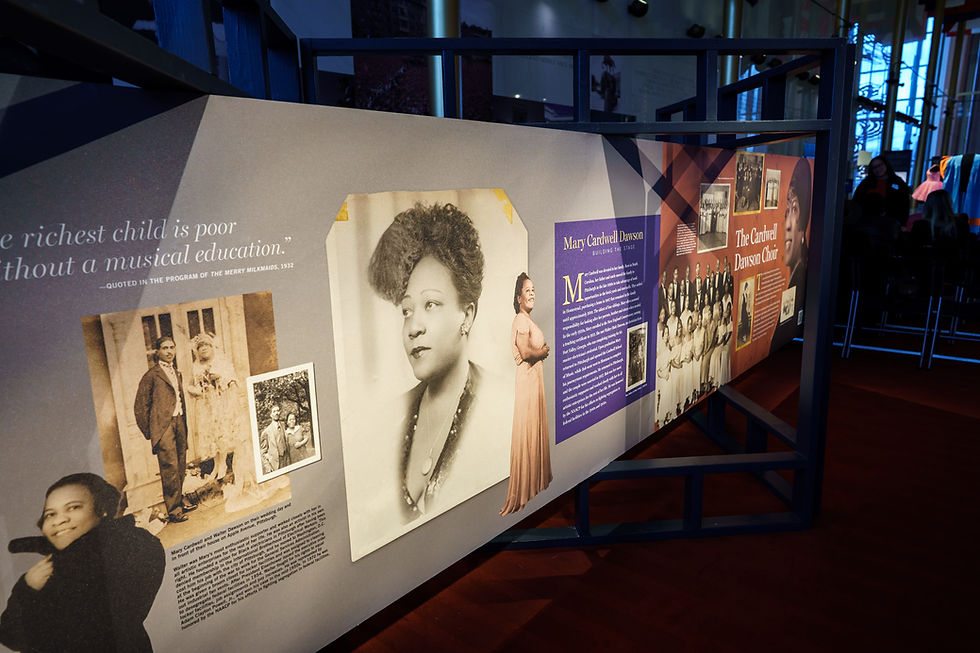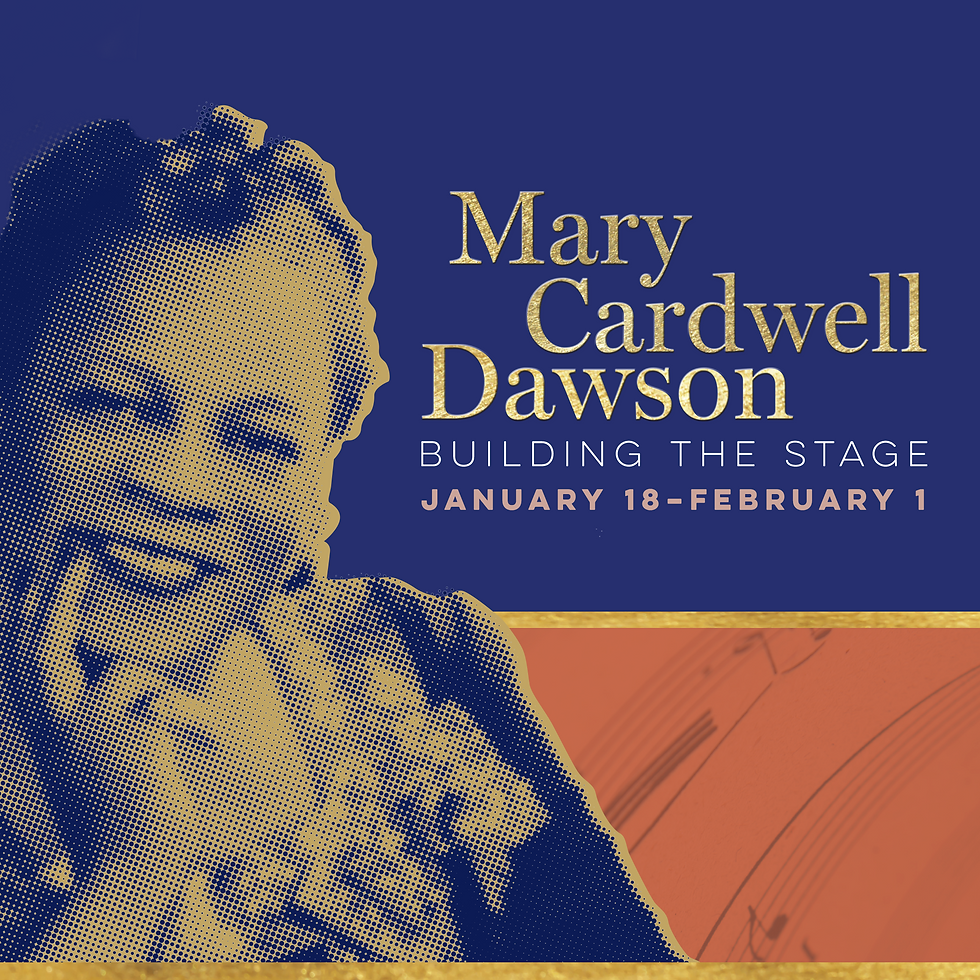

What is
HIDDEN VOICES?
The Hidden Voices Program seeks to tell the stories of artists, particularly concert and operatic performers, whose achievements largely have been omitted from the historical narrative. We seek to bring these individuals the attention they deserve and introduce them to the public as well as to the classroom and the teaching studio.
OUR GOALS ARE TO:
-
Honor those whose achievements and successes did not receive the recognition and notoriety they deserved.
-
Bring these stories into the historical narrative.
-
Provide historical information to all who seek to learn about Black performers on the concert and operatic stages.
-
Focus on singers from all eras who were based in the United States, but also to include those who sought opportunity abroad in recognition of the barriers they faced in “less restrictive” environments.
-
Recognize not only their performances, but their advocacy for their race in political, social and educational arenas.
-
Engage educational institutions and arts organizations in the recognition and inclusion of these individuals in programming and curricula.

The Inspiration for Hidden Voices:
Madame Mary Cardwell Dawson
The Denyce Graves Foundation and the Hidden Voices Program draw inspiration from the life and career of Madame Mary Cardwell Dawson (1894-1962). Originally from North Carolina and raised in Homestead, Pennsylvania (across the river from Pittsburgh), Mary’s story epitomized the pathway followed by many Black Classical artists of the time. She was a performer, educator, impresaria and, most importantly, a passionate advocate for Black singers who wished to pursue a career on the stage.

Dawson founded a successful School of Music where students of all ages studied performance, music theory, elocution, deportment, and theatrical productions. She founded and directed the Cardwell Dawson Choir, an auditioned group that appeared in local and regional festivals in the 1930s, won competitions throughout Pennsylvania, and performed at the 1939 World’s Fair in New York City. This remarkable group became the core of performers for her opera company.

1050 Connecticut Ave NW, Ste. 500
Washington, DC 20036
1325 Avenue of the Americas, 28th Floor
NYC, NY 10019
917-821-3437
Our Federal tax ID is 86-2276658.
The Denyce Graves Foundation is a 501(c) (3) non-profit organization.
We honor Mary Cardwell Dawson and her extraordinary achievements. Her legacy lives on in the careers of today’s performers, directors, composers, and administrators whose presence and achievements can no longer be denied.
Hidden Voices in action
The Hidden Voices program brings to the forefront the histories of performers and creators of the past whose stories do not appear in the traditional historical accounts. We seek to collaborate across various organizations and projects to raise awareness in classrooms, teaching studios and concert stages through publications, performances, artistic commissions, and special events.
During our launch weekend in 2023 Dr. Karen M. Bryan, Coordinator of the Hidden Voices Program, presented “Operatic Self-Determination: Mary Cardwell Dawson and the National Negro Opera Company in Washington, D.C. and New York City” as part of the Talking About Music series sponsored by The Library of Congress and The American Musicological Society. Watch Dr. Bryan's lecture below:
THE DENYCE GRAVES FOUNDATION CELEBRATES BLACK HISTORY MONTH

Dawson advocated for the highest possible performance standards for church choirs in the Pittsburgh area. She argued that to do less was unworthy of the intended praise, and damaged public perception of the excellence inherent in such choral performances, thus diminishing race pride.
She was active in the National Association of Negro Musicians. She organized the Pittsburgh Chapter in 1931 and served as its president through much of the decade. She served the national organization first as the director of branch activities, and finally as National President from 1940-1942.
On August 29, 1941, Madame Dawson, as president of NANM, produced a historical collaborative performance of Giuseppe Verdi’s Aïda. She brought together members of Black opera companies and choral groups from every major city from Chicago to New York and invited individual members of NANM to join in the production. She recruited performers from community dance groups and dramatic clubs, church choirs and music clubs to ensure a significant regional impact and to fill the stage of the Syria Mosque. She hired members of the Pittsburgh Symphony Orchestra and a former director from the Metropolitan Opera, Frederick Vajda, to conduct. Three months later, a repeat performance in Chicago launched the National Negro Opera Company. Under her direction this organization performed consistently for twenty years, contributing significantly to the training and professional opportunities available for more than 1,800 individuals.

EDUCATING IS ACTIVISM:
SUPPORT DGF
DGF is focused on the intersection of social justice, American history, and the arts. Deeply inspired by the achievements of America’s hidden musical figures, the foundation is invested in doing research and educating the public about their remarkable stories of courage and persistence. From enriching our musical heritage to preparing the diverse pool of tomorrow’s vocal stars, DGF will positively impact how artists are valued in this nation, encouraging inclusive opportunity, access, and advocacy for the next generation.

Perhaps most importantly, Madame Dawson was a fierce advocate for all performers and composers of color. During her career she represented recitalists, promoted works by Black composers, lobbied directors, venues, managers and unions, and took her issues directly to political figures such as First Lady Eleanor Roosevelt and President John F. Kennedy. She worked with other activists for education and equality including Mary McLeod Bethune, Dorothy Ferebee, Dorothy Height, Coretta Scott King, and Dr. Martin Luther King. She fought segregated venues, unequal labor practices, inequitable expectations for business contracts, and unequal pay.







